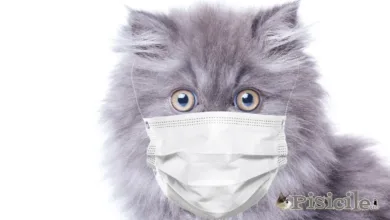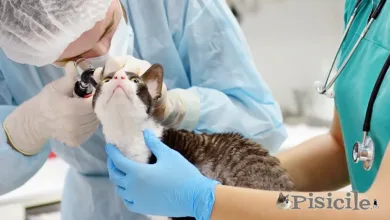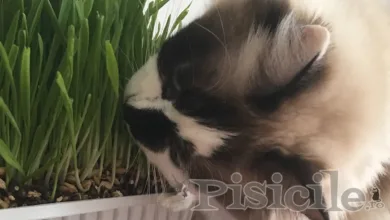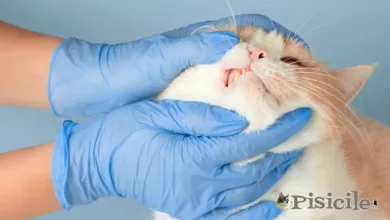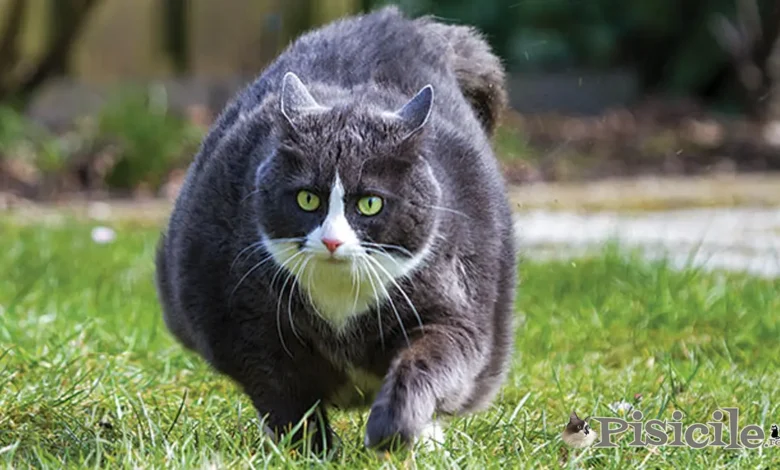
In the contemporary world, the problem of obesity is not limited to humans only. More and more cats are suffering from this condition, putting their health and well-being at risk. Obesity in cats has become a major concern for veterinarians and pet owners alike, as it can lead to a number of serious health complications and a decreased quality of feline life.
It should be established from the outset that a slightly fat cat is not necessarily obese. However, it is important to spot obesity at its first signs and take action.
Subject
How do you know if your cat is overweight or obese?
Usually, the first signs can be difficult to notice, especially when you live with your cat day in and day out. That's why it's recommended to schedule regular checkups with your vet to monitor your cat's health. During these visits, the vet can assess your cat's weight and body fat percentage to identify potential problems.
A healthy cat should have between 16 and 25% body fat. If the fat percentage exceeds 40-50% of the ideal weight, i.e. between 56 and 65%, we may be dealing with obesity.
However, we don't have to wait until obesity becomes apparent. There are simple ways you can assess your cat's health at home. You can easily palpate the cat's rib cage area, and if you can feel the ribs without difficulty, her weight is probably within normal parameters. If you can't feel the ribs, the cat may be overweight or obese. Here are some additional signs to look out for:
- When you look at her from above, you can't make out a waist and the body does not show an obvious thinning towards the belly, but the opposite.
- You may find that the collar needs to be adjusted wider to fit.
- The cat appears to be less active, spending more time sleeping or having difficulty moving, and its breathing may become more difficult.
By paying attention to these signs and monitoring your cat's weight and behavior, you can intervene quickly and effectively to ensure a healthy and energetic lifestyle.
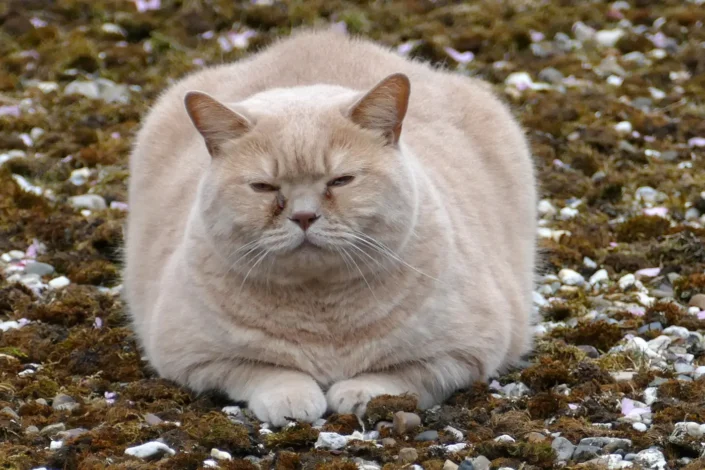
Causes of obesity in cats
The causes of obesity in cats and humans are remarkably similar. High-fat diet, overeating, sedentary lifestyle and slowing metabolism with age.
High fat diet and overeating
Excessive consumption of high-fat foods can lead to unwanted weight gain in cats, just as it does in humans.
Many owners provide unlimited access to food, which can lead to overeating and, by implication, weight gain. In addition to this aspect, additional snacks and rewards can also contribute to the problem of extra pounds. Also, the quality of food is a very important factor that can bring obesity to cats.
Although cheap food may seem like an economical option, it can have serious consequences for the cat's health in the long term, especially if the cat has specific dietary requirements or requires special food. Poor quality food may contain artificial additives that can disrupt the cat's taste and satiety and contribute to overweight. It is important to choose a high-quality food, rich in protein and low in fat and carbohydrates.
Lack of exercise
Similar to humans, sedentary behavior can be a crucial factor in the development of obesity in cats. Lack of physical activity can lead to the accumulation of extra pounds and associated health problems.
Cats raised in urban environments, especially those living in apartments, are more susceptible to obesity than those that have access to outdoor spaces. Even though keeping your cat indoors protects it from various outside dangers, lack of physical activity can be a major problem. Therefore, owners should provide their cat with opportunities for physical activity, such as 30-60 minute play sessions a day, especially if they notice that they are starting to gain weight. Interactive cat play can be beneficial for both owner and pet, stimulating their natural hunting instincts and keeping their weight within healthy limits. Interactive toys can also be a great way to keep your cat active and interested throughout the day.
Sterilization
Spaying can affect the cat's metabolism, causing a tendency to gain weight. This phenomenon is observed in many cases after surgical intervention.
There are many sources that claim that spayed cats tend to gain weight because their metabolism changes and becomes slower after surgery. Another reason could be that in the absence of the heat cycle, the cat loses its natural ability to regulate food intake, causing weight gain. That is why veterinarians recommend adjusting the cat's diet after the first weeks after surgery to prevent the risk of weight gain.
It is important that sterilized cats receive a correct diet adapted to their needs. Therefore, it is advisable to give them specialized food for sterilized cats, which has the following characteristics:
- Low fat content, no more than 10%, and carbohydrates, no more than 30%, to provide the necessary energy without contributing to weight gain.
- Balanced 20-25% protein to support muscle health and development.
- Increased fiber content to promote healthy and regular intestinal transit.
Metabolism slows down with age
As your cat ages, its metabolism can slow, making it difficult to maintain a healthy weight without appropriate adjustments in diet and activity level.
Risks of obesity in cats
Obesity in cats is the result of excessive fat accumulation in the body, and this accumulation can have serious consequences for their health, just as it does for humans.
Among the risks and negative effects associated with feline obesity are:
Increased risk of diseases: Obesity predisposes the cat to various diseases, such as diabetes, hypertension, joint diseases, various forms of cancer, heart diseases, osteoarthritis, respiratory problems, as well as impaired liver and kidney function.
Weakening of the immune system: Being overweight can compromise your cat's immune system's ability to fight infections and other illnesses.
Hepatic lipidosis: Fat deposits in the liver can lead to the development of a serious condition called hepatic lipidosis, which can be fatal if not treated properly.
Pressure on internal organs and joints: Extra weight puts pressure on internal organs and joints, which can cause discomfort and increase the risk of related conditions.
Reduced activity and impaired mood: Obese cats may have difficulty moving and playing due to excess weight, which can lead to a decrease in activity and mood.
Difficulties in medical interventions: Medical consultations and surgeries can become more difficult due to the extra weight of the cat.
In conclusion, obesity in cats is a serious problem that can have serious consequences on health and quality of life. It is important to monitor your weight and take preventive measures to prevent and manage this problem.
Recommended: How to make your cat lose weight. Useful advice.
I strongly recommend taking your cat to the vet at least twice a year to assess its health.
